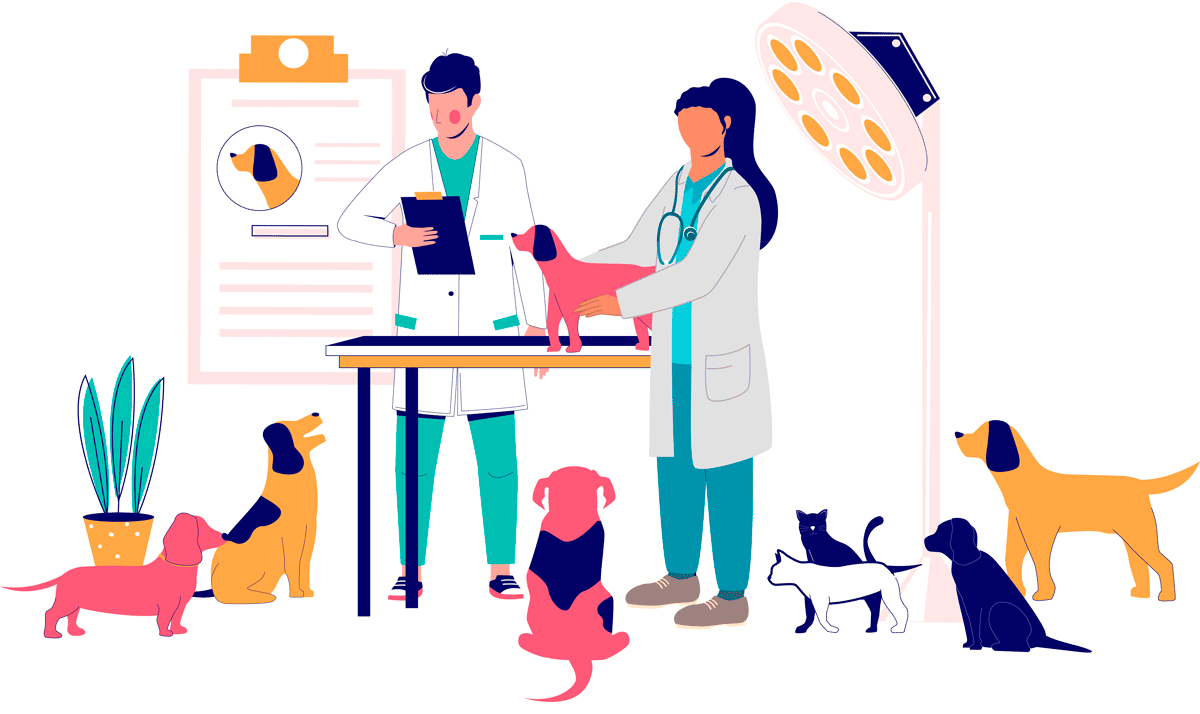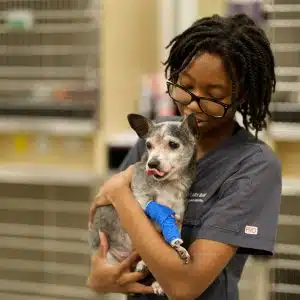The Relevance of Very Early Detection: Insights From a Veterinary Oncologist
Early discovery of cancer in animals is a crucial subject for family pet owners and veterinary experts alike. Veterinary oncologists stress the value of acknowledging subtle indicators that might suggest serious health problems. Common signs and symptoms often go undetected up until they intensify. Understanding these very early caution indications and advancements in diagnostic strategies can make a substantial difference. What actions can animal owners require to enhance their animals' opportunities of very early medical diagnosis and much better therapy end results?
Understanding Cancer Cells in Animals: Usual Types and Symptoms
While many pet dog owners might not realize it, cancer cells is a substantial health and wellness problem impacting animals, just like it carries out in humans. Typical kinds of cancer in pets consist of lymphoma, mast cell growths, osteosarcoma, and mammary lumps. These hatreds can materialize in numerous ways, relying on their location and type. Symptoms often include inexplicable weight loss, consistent throwing up, modifications in cravings, or unusual lumps and bumps. Pet dogs may additionally display sleepiness, trouble breathing, or reluctance to workout, which can indicate underlying health and wellness concerns. Early indications can be subtle, making it necessary for pet owners to be observant of their family pets' actions and physical condition. Comprehending these common types and associated signs and symptoms can equip owners to seek veterinary treatment without delay, possibly bring about earlier medical diagnosis and therapy choices. Acknowledging the signs of cancer in family pets is an important action in the direction of improving their health and wellness and quality of life.
The Role of Veterinary Oncologists in Early Detection
Vet oncologists play an important function in the very early detection of cancer cells in pet dogs, as their specialized training furnishes them with the abilities necessary to recognize refined indicators that might be ignored by family doctors. They utilize a combination of medical proficiency and progressed diagnostic devices to examine people extensively - Board Certified Veterinary Oncologist. By acknowledging early symptoms and threat elements, oncologists can guide family pet owners towards timely treatments, enhancing the possibilities of effective treatment
Additionally, vet oncologists commonly work together with general specialists to establish screening protocols customized to certain types or age, improving the effectiveness of very early detection efforts. They inform family pet owners on the relevance of normal exams and recognition of changes in actions or physical problem. Through these aggressive actions, vet oncologists significantly contribute to improving results for pets identified with cancer, highlighting the essential nature of their function in veterinary healthcare.
Developments in Diagnostic Techniques for Family Pet Cancer Cells
Developments in analysis strategies have actually markedly boosted the ability to spot cancer cells in animals at earlier phases. Techniques such as innovative imaging, including MRI and CT scans, provide detailed interior views, enabling vets to identify growths that might not be palpable. In addition, the growth of minimally intrusive treatments, such as fine needle aspirates and biopsies, allows exact sampling of cells for histopathological analysis with reduced tension for the animal.
Emerging molecular diagnostics, including hereditary screening and biomarker identification, are transforming the landscape of vet oncology. These techniques can recognize particular cancer kinds and forecast responses to therapy, facilitating individualized care strategies. In addition, advancements in lab strategies, such as fluid biopsies, are starting to use non-invasive choices for keeping an eye on growth development and therapy effectiveness. Collectively, these technologies stand for a considerable leap ahead in vet medicine, emphasizing the critical role of very early discovery in boosting outcomes for family pets diagnosed with cancer.
Exactly How Family Pet Owners Can Recognize Indication
Exactly how can pet dog owners end up being alert in recognizing possible indication of cancer cells? Awareness of physical and behavior modifications in family pets is crucial. Common signs include uncommon sleepiness, loss of cravings, or sudden weight changes. Pet dog owners must likewise take note of consistent vomiting or looseness of the bowels, which may signal underlying issues.
Changes in the skin, such as swellings, bumps, or sores that do not heal, require prompt veterinary focus. Additionally, owners ought to keep in mind adjustments in alcohol consumption practices, enhanced peeing, or difficulty in breathing. Inexplicable hopping or pain may additionally be indications of even more major problems.
Normal veterinary examinations can aid identify these indication early. By keeping a close monitoring of their pets' health and wellness and actions, proprietors can play an essential function in very early detection, potentially bring about better outcomes must cancer be diagnosed. Recognizing these indications may significantly affect a family pet's lifestyle.
The Effect of Very Early Detection on Therapy End Results
Early discovery of cancer cells in pets plays an essential role in determining therapy end results, as it commonly permits a bigger series of therapeutic alternatives. When cancer is detected in its very early stages, vets can implement much less invasive treatments, boosting the chance of successful treatment. Early-stage cancers might likewise react far better to chemotherapy or radiation, resulting in improved survival prices and total high quality of life for the pet.
Additionally, punctual medical diagnosis assists in a much more tailored therapy strategy, aligning with the details requirements of the pet. This can include customized medication programs or surgical treatments that are much less aggressive. Conversely, late-stage detection typically results in restricted alternatives, a lot more aggressive treatments, and poorer prognoses. As a result, the significance of very early detection can not be overstated; it essentially alters the trajectory of therapy, making it essential for pet dog proprietors to stay vigilant for any kind of indications of health problem in their beloved companions.
Regularly Asked Concerns

How Can Diet Plan Influence Cancer Risk in Pets?
Diet substantially influences cancer cells risk in pet dogs, as particular nutrients and food types can either prevent or advertise tumor development. A well balanced, nutrient-rich diet plan might help in reducing the probability of creating view website cancer in animals.
Are Certain Breeds More Prone to Cancer cells?
Specific pet dog breeds, such as Golden Retrievers and Fighters, show greater cancer susceptibility as a result of genetic tendencies. Some feline types also reveal boosted cancer threats, highlighting the relevance of breed-specific health and wellness recognition among animal proprietors.

What Are the Costs Related To Very Early Cancer Cells Discovery?
The prices connected with early cancer cells discovery can differ greatly, encompassing diagnostic tests, assessments, and prospective therapies - Pet Cancer Surgery. websites Spending in these services commonly leads to much better health results, inevitably conserving on extra extensive future medical expenses
Can Injections Avoid Cancer Cells in Animals?


Injections might decrease the threat of certain cancers cells in animals, specifically those linked to viral infections. Their efficiency differs, and pet owners need to speak with veterinarians for customized suggestions regarding vaccination and cancer cells avoidance strategies.
Exactly How Commonly Should Pets Be Screened for Cancer?
Family pets need to usually be screened for cancer yearly, particularly as they mature or if they show threat factors. Regular veterinary examinations can assist determine potential concerns early, improving therapy outcomes and total wellness administration.
Early discovery of cancer in pets is an essential topic for pet dog owners and veterinary specialists alike. Early indicators can be refined, making it essential for pet dog proprietors to be watchful of their pets' behaviors and physical problem. Veterinary oncologists play an essential duty in the early detection of cancer cells in animals, as their specialized training furnishes them with the skills required to identify refined signs that might be ignored by this general experts. By maintaining a close monitoring of their pet dogs' health and actions, owners can play an essential function in very early detection, potentially leading to better results need to cancer be detected. Early discovery of cancer in animals plays an essential duty in figuring out treatment outcomes, as it frequently allows for a wider array of healing alternatives.